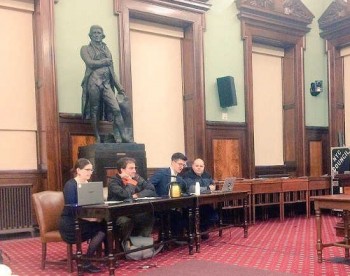On Tuesday, representatives of four FOSS friendly agencies testified before a New York City committee considering bills that would mandate the use of FOSS by city government.
“Free and open source software has many advantages over proprietary software,” Karen Sandler, the executive director of the Software Freedom Conservancy, testified Tuesday before the New York City Council Committee on Contracts. “Studies show that, over time, free software is safer from vulnerabilities. Free software is auditable — security and functionality can be verified upon inspection. Anyone can independently assess the software and its risks. Developers can more easily and quickly repair discovered vulnerabilities or bugs (and bugs are very common in all software – the Software Engineering Institute estimates that an experienced software engineer produces approximately one defect for every 100 lines of code). Free software removes dependence on a single party, as anyone can make changes to their version of the software. And municipalities can hire any contractor on the open market to work on the software.”

She was joined by Free Software Foundation’s Executive Director, John Sullivan, Open Source Initiative’s board member, Paul Tagliamonte, and Participatory Politics Foundation Executive Director, David Moore, who all testified in support of the bills.
This is local politics at its finest or worst — ofttimes both at once. While New York City might have a nation size population and infrastructure, with a budget that would make even some financially successful European countries envious, local government still functions much like local government everywhere, just on a grander scale. Most issues covered in a typical city council session border on the mundane, and except at election time, tend to be reduced to dollars and cents. On the day that Kallos’ bill was introduced, for example, the council dealt with numerous zoning issues, did some tax finagling, discussed issues relating to taxis and limousines, and somewhere along the way found time to refer the two open source bills to the committee before which Sandler and the others testified. Tuesday’s hearing was the first public action taken by the committee, and at the end of the day both bills were “Laid Over by Committee,” which puts them into a limbo from which they might or might not one day emerge.
One thing is fairly certain, if they do emerge, it’s not likely to happen tomorrow, next week or next year, but maybe the year after, or even the year after that. It’s taken nearly two years for them to go from their initial introduction to this step, so there doesn’t appear to be a lot of enthusiasm or well placed supporters pushing to get ‘er done. Most likely, just the opposite. It’s a given that the committee members are getting earfuls from the likes of Oracle and Microsoft on how costly it would be for the city to attempt a migration away from “proven” proprietary solutions to “unproven” open source software — even though neither act necessarily calls for massive migrations.
Still, these are baby steps in the right direction, and Sandler did a fine job making the case for free and open source software and against software of the proprietary variety, speaking to a group that most likely doesn’t understand much about either — except that proprietary licensing fees often make balancing the city’s budget nearly impossible.
“Companies effectively hold governments hostage with proprietary software,” she explained. “In the case of a security vulnerability, governments must wait for the vendor to admit there is a problem and then provide a fix for it. If the city needs a new feature or other functionality added, they are out of luck if the vendor doesn’t consider that work high priority. If the company goes out of business, the city has to find another solution. Proprietary software locks the city into the original vendor forever. In contrast, if the city uses free software, anyone familiar with the software can become a vendor.”
When making the case for the Civic Commons Act, Sandler discussed Sahana, a FOSS project developing emergency preparedness software, which began as a response to the December 2004 Indian Ocean earthquake and tsunami and has since been deployed by numerous countries around the globe. New York City began using Sahana in 2007, and the software was used to help manage the response to Hurricane Irene in 2011 and Hurricane Sandy in 2012.
“The use of the disaster recovery software … shows the huge benefits that can be gained from governmental use of free software,” she said. “Sahana was first written to handle disaster recovery in Sri Lanka, yet it’s been used and improved for use all over the world. Instead of each municipality starting from scratch, they build on each others’ work. Every single improvement made in catastrophe response benefits everyone. I hope the city can learn from [the] success of Sahana and adopt this framework for collaborating with other municipalities to pool their limited resources.”
If evoking the same free and open source software the city used to get through the aftermath of super storm Sandy wasn’t enough to bring the issue home, she took another step in that direction by relating her own up-close-and-personal experience with proprietary software, which is the only solution currently available to her for dealing with a potentially life threatening medical condition.
“On a personal note, I am deeply familiar with the dangers of proprietary software. I have hypertrophic cardiomyopathy (I have a big heart) and have an implanted medical device with software that I cannot review or work with my healthcare professionals to modify. I rely on one company to ensure its safety and hope that they provide the life-critical updates I need. I have no real choice because there is no free and open source software defibrillator. I wonder every day if I will get an inappropriate shock or have my device fail through inaction. I live with proprietary software in my body, knowing that it has vulnerabilities I can do nothing about.”
The conservancy is also making suggestions on ways the bills can be changed to be more effective. The group has submitted improvements to the Free and Open Source Software Act via GitHub, and when addressing the Civic Commons Act, Sandler told the committee “we recommend that the act be amended to be platform neutral.”
Where this goes from here is anyone’s guess. Again, I wouldn’t hold my breath — but nor would I count these proposals out just yet.
We’re currently in the midst of our 2016 Indiegogo fundraising drive. Your support is crucial. Won’t you please visit our fundraising page and make a contribution to support FOSS Force?
Christine Hall has been a journalist since 1971. In 2001, she began writing a weekly consumer computer column and started covering Linux and FOSS in 2002 after making the switch to GNU/Linux. Follow her on Twitter: @BrideOfLinux







Thank you for covering this important development. I wish we had more resources to lobby governments for FOSS. It makes financial sense and promotes freedom.